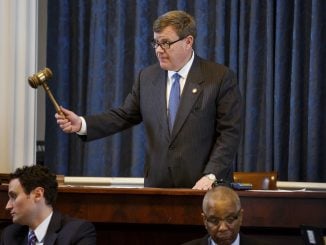RALEIGH — Republican legislative leaders have reached an agreement on adjustments to the second year of the compromise state budget that was approved last fall.
House and Senate leaders unveiled the highlights Tuesday evening in a joint press conference at the legislative building.
“The good news, North Carolina is well prepared to weather a recession,” said Senate Leader Phil Berger (R-Eden).
“We’re going to run a government as much like a business as possible,” House Speaker Tim Moore (R-Kings Mountain) said during the press briefing. “We’re going to live within our means. We’re not going to overspend. We’re not going to overtax.”
One challenge for GOP legislators who control the General Assembly had been to figure out what to do with an additional $6.2 billion in projected revenues, the Associated Press reported a day earlier.
The new fiscal year starts Friday.
Topline items in House Bill 103, the proposed budget bill, include a net appropriation for FY 2022–23 of $27.9 billion. While that appropriation is a 7.2% increase from FY 2021–22, it is less than the $29.3 billion budget Governor Roy Cooper put forth in May.
According to lawmakers, the proposal will bring the Rainy Day Fund balance to a record $4.75 billion at the end of the biennium and around $7.7 billion overall in various reserve funds.
The budget measure also looks to transfer $1 billion into a newly created State Inflationary Reserve that Berger and Moore said was in anticipation of a recession.
“This is a reminder of where we were in 2010. Some of our predecessors really did not prepare for economic downturns,” Moore said. It seems clear to anyone who has filled up their car recently that a lot of policy that is happening out of D.C. is absolutely in shambles.”
Not included in the budget proposal is Medicaid Expansion, however, a bill already passed by the Senate is addressing possible Medicaid Expansion with action still needed to be taken by the House.
There are no new tax cuts in the budget either. When asked during the press briefing about the lack of new tax cuts, Berger said “This is the budget that we have.”
“It is the right budget for North Carolina at this time. Some things made the cut but some things didn’t,” Berger said.
Berger was asked by the media if they think the governor will be on board, and he responded that they haven’t received a commitment from Cooper yet.
“But it is our hope and really expectation that he will either sign it or let it become law,” Berger said.
Prior to the release of the budget proposed by lawmakers, Cooper had tweeted “I’m encouraged that both the House and Senate agree that North Carolina needs to expand Medicaid. It is imperative that an agreement is reached to get this done now. I will review the full budget when it is released.”
A joint press release by Berger and Moore included a list of major bullet items contained in the budget.
Salaries
- Establishes a labor market salary reserve of $80 million for state agencies to address staff shortages and help recruit and retain capable employees.
- A 3.5% pay raise for most state employees, for a 6% raise over the biennium.
- On average, teachers will receive a 4.2% pay raise, bringing the average teacher pay raise to 6.7% over the biennium. Over the biennium, including bonuses, teachers will receive an average 14.2% additional compensation.
- Increases the starting salary for entry level teachers.
- Noncertified public school employees, like bus drivers, will receive either a 4% pay raise or an increase to $15/hour, whichever is greater.
- An additional $70 million to the state-funded teacher salary supplement. This brings the total amount to $170 million. The budget increases the state-funded teacher supplement cap to $5,000.
- Provides an additional 1% one-time retiree supplement for a total of 5% over the biennium.
- Continues the enhanced COVID rates that the Department of Health and Human Services paid out to nursing homes and other long-term care facilities.
Education
- Funds an additional $1 billion over the FY 2021–22 amount for a total of $16.5 billion.
- Includes $3.9 million to cover the copays for students that qualify for reduced-price lunches.
- Funds an additional 124 literacy coaches and early learning specialists to aid in early literacy efforts.
- A $431 million transfer over the biennium from the N.C. Education Lottery to the Needs-Based Public School Capital Building Fund. Over the course of the next 6 years, a projected $2.6 billion will be spent on school capital.
- Expands the income level requirements for the Opportunity Scholarship Program so more families can send their children to a school of their choice. The new income eligibility level is equal to or less than 200% of the amount required for free or reduced-price lunch.
- Allocates an additional $56 million in recurring funds to the Opportunity Scholarship Grant reserve, for a total of $150.8 million that can be awarded to families that qualify for the scholarship.
- Provides an additional recurring $16.3 million to the Personal Education Student Accounts for Children with
- Disabilities Program, to clear the program’s waitlist. The program’s total funding in FY 2022–23 is $47.9 million.
- Creates a recurring $250,000 grant for schools to purchase feminine hygiene products in schools.
School Safety - Provides an additional recurring $15 million for the School Resource Officer Grant program, specifically for elementary and middle schools.
- Increases the state match for the School Resource Officer Grant program for low-wealth school districts to $4 per every $1 in non-state funds. All other school districts will be eligible for a state match of $2 per every $1 in non-state funds.
- Provides an additional $32 million for School Safety Grants to support students in crisis, school safety training, and safety equipment in schools.
- Allocates $26 million more to the At-Risk allotment to reflect the current salary necessary to provide one School Resource Officer for each high school.
- Provides $5 million for cybersecurity and bomb threat preparedness at North Carolina’s HBCUs.
- Requires the Center for Safer Schools to gather data on existing school safety systems, policies, and procedures, and to report information and recommendations for improving school safety to the General Assembly.
Capital/Infrastructure
- Provides $883 million for water and wastewater infrastructure projects, bringing the total amount available for water and wastewater infrastructure for the biennium to $2.5 billion.
- Provides $300 million to build a new Education Complex and Governor’s Office in downtown Raleigh, and to renovate and demolish other downtown government buildings.
- Includes $250 million for a reserve to help defray cost overruns for state capital projects due to inflation.
- Provides $120.8 million in additional capital grants to local governments and non-profit entities.
Other Items
- Redirects 2% of sales tax revenue — approximately $193.1 million — to the Highway Fund to support a variety of transportation purposes, increasing to 6% in 2024–25 and thereafter. This is the first step to address declining transportation revenues to keep up with population growth.
- Provides an additional $5 million for the GREAT Grants to expand broadband access in underserved areas. This increases the amount for GREAT Grants to $20 million recurring. The state expects to receive at least
- $100 million from the federal Infrastructure and Investment Jobs Act for broadband.
- Transfers $950 million to the State Emergency Response and Disaster Relief Reserve, of that $215.8 million is appropriated for disaster recovery efforts from previous events and mitigation efforts to prepare for future flooding and natural disasters.
- Increases the NC Pre-K provider reimbursement rates by 5%. Private child care facilities, which were slated to receive a 4% rate increase with funds from the 2021 Appropriations Act, will now receive a 9% reimbursement rate increase in FY 2022–23.
- Appropriates $1.8 million from the federal Help America Vote Act (HAVA) grant to update and maintain voter lists and to continue enhancing election technology and security improvements.
- Provides $1 million to the Economic Development Partnership of North Carolina’s Megasite Readiness Program, with the intent to identify additional megasites in North Carolina.
- Allocates $1 million to support the Innovation and Entrepreneurship Hub at Fayetteville State University.



